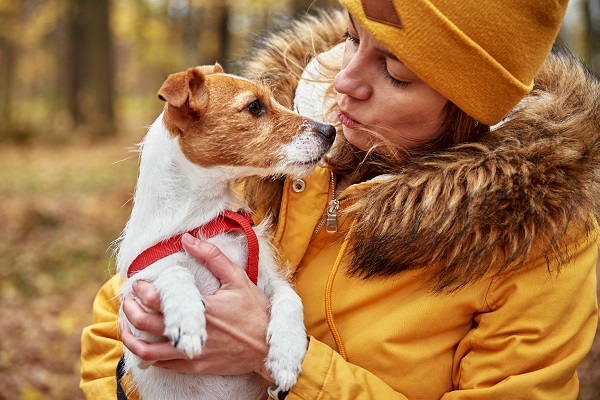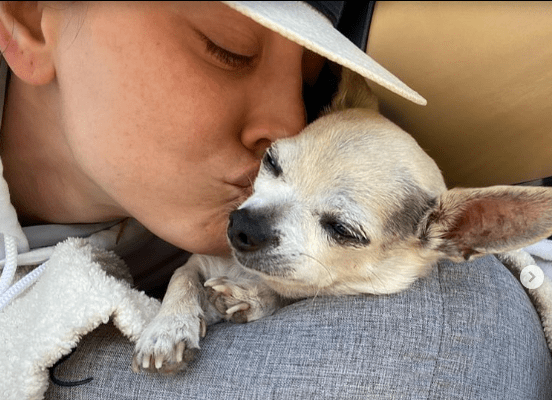As dog parents, we love to attribute human emotions to our babies. We analyze all their actions and rationalize them thinking that there are meaningful and deep feelings and thoughts behind them. This particular tendency is considered anthropomorphism, whereby a person attributes human behavior or characteristics to deities, objects, and animals.
When you look into the soulful eyes of your dog, you wonder how it is possible. These beings have had a connection since the earliest of time. There are plenty of non-believers who have been skeptical of such practices in the days gone by. They say that these feelings and thoughts are manifestations of our minds.
Do dogs have feelings?
The accurate answer to this question would be yes. Dogs’ understanding of human emotions is empathetic and profound. Your dog not only understands what you are feeling at any moment, but they also feel the same.
They build a deep connection with you and are more precisely aware of your mental state because they are intelligent and thus have successfully made relationships.
Dogs possess a wide range of emotions termed “human,” as enumerated below:
- Joy
- Jealousy
- Love
- Shame
- Grief
- Laughter
No less than Charles Darwin has this to say about dogs – “under the expectation of any great pleasure, dogs bound and jump about extravagantly, and bark for joy.” This is something dog lovers, parents, and owners understand, and it is easy for them to interpret such expressions from their canine babies. It is clear for all to see when a dog is being joyous. They could keep wagging their tails or bound about the home in such cases.
A researcher at the University of Vienna in Austria named Friederike Range found that dogs tend to get jealous because they understand concepts such as fair play and equality. Their test found that when some dogs saw a dog receiving a treat without following the command, they stopped following through.
Gregory Berns, a neuroscientist, is credited with finding the evidence that connects dogs and humans in loving relationships, which means your dog does love you. In his book – How Dogs Love Us: A Neuroscientist and His Adopted Dog Decode the Canine Brain – he explained his findings and research on the canine capability to love in detail. In his test, he found that dogs have a part of the brain responsible for positive emotions, which is there in humans as well.
Dogs understand that their actions would have consequences, so they are naughty. They know that adverse reactions will come their way because of that. It is a reason when you come to your home after spending some time out of it and see that your dog is approaching you with a smile, you immediately know that your living room could right now be full of trash. Dogs are terrible when it comes to hiding their emotions.
The expression of grief in dogs is different from how we humans do it, but it is definite that they can comprehend extreme sadness. Whenever one of their pack members or a family member passes away, they experience any combination of the following phenomena:
- Loss of appetite
- Fear
- Depression
- Lack of sleep or oversleeping
- Anxiety
American Society for Prevention of Cruelty to Animals conducted a study in 1996 where it found that 66% of test subjects expressed at least four behavioral changes as a reaction to a loss they suffered.
A researcher from Sierra Nevada College named Patricia Simonet conducted a study whereby she proved that dogs could indeed express laughter. At times, they produce quick or excited exhales, forms of laughter.
The effect of anthropomorphism
According to Dr. Jaak Panskepp, the issue with anthropomorphizing dogs is that those who do that assume that they know what the dog is thinking when they should worry about what they are saying. Since, in most cases, commands form the basis of our interaction with our dogs; we need to understand why our dog is doing what they are doing.
It is especially so when they do not follow our commands. Are they disobeying us, or are we sending them mixed signals that are causing them to stress and refuse to follow our directions?
Why is it wrong to treat a dog like a human?
There are several reasons why treating your dog like a human is problematic. This way, we might be setting them up for failure or giving them more qualities than they possess. It also sets the bar too high in terms of expectations that we have of them.
It also provides owners with the justification for punishing a dog because they think the dog knows what they have done. Simply put, there is a substantial difference between dogs and humans – their communication system is entirely different.
Benefits of anthropomorphism
Despite its supposed fallacies, there are indeed several benefits of anthropomorphizing dogs. For starters, it helps reduce instances and tendencies that can lead to animal cruelty and allows us to treat animals ethically as they ideally should.
This particular tendency is great for fulfilling the emotional needs of humans who practice the same. When we perceive an animal to be like a human, it increases our feelings of emotional security and comfort. It is another reason why emotional support animals and therapy dogs work as well as they do.
Things to avoid with anthropomorphizing your dog
If humanizing your dog makes you love them to bits and care for their well-being with all your might, it is 100% okay and great. However, it is not okay if such a thought process makes you attribute vengeance or guilt to them.
If you see your dog exhibiting any of the following behaviors, please understand that it is a sign of fear at your anger rather than an admission of guilt:
- pinning their ears back
- freezing
- walking away
- blinking quickly
- licking their lips
- flicking their tongue
- turning their head sideways
- lowering their bodies down
Also, dogs are not spiteful or vengeful at all. They did not chew or poop, or pee on your favorite shoe because you yelled at them in the morning.
Examples of unproductive anthropomorphism
Following are some examples of anthropomorphism being unproductive:
- Expecting them to understand human social norms automatically.
- Wanting them to understand verbal orders without proper training.
- Assuming that they enjoy humans hugging them as they do to each other.
- Expecting them to know instantly that a prey animal is supposed to be their friend.
- Resisting helpful tools such as muzzles and crates just because you think they are mean.
Read Also: How to Teach a Dog – Dog Training Tips
Conclusion
In an article on human anthropomorphism of dogs published in Psychology Today, it was stated that convention ruled that if a human indulged in such practice, they were weak intellectually, and their dynamic systems were overactive.
However, it also debunked such theories thanks to evidence from Sam Gosling, a researcher at the University of Texas. He studies animal psychology the same way as one would do with a human.
He used the personality traits such as extraversion, neuroticism, agreeableness, openness, and conscientiousness and showed that dogs and humans have the same personality traits.
FAQs
Q: Why do people anthropomorphize their dogs?
For some people, such a practice helps them establish a connection with their dogs and show empathy toward them. It also helps them care for themselves the best and prioritize their well-being.
Q: Is it true that your dog acts like you?
Ans: Researchers at Michigan State University have found out that dogs often adopt the personality traits of their parents or owners. They discovered that just like humans, dogs’ personalities are shaped with time.
Q: Do dogs instinctively like people?
Ans: Unlike wild animals such as wolves, dogs are attracted to humans. Experiments in this regard show that domestication has caused them to be distinctly interested in what we are doing.
Q: What is an example of anthropomorphism in pets?
Ans: An example of anthropomorphism in pets is when someone believes that their dog peed on their shoes to take revenge on them or that they feel guilty when caught doing something they are not supposed to.
Q: Why do dogs like a human?
Ans: Dogs select the humans they like based on the positive socialization and interaction they have had with them. They are especially impressionable when they are pups.
 DogExpress
DogExpress





















 in Chandigarh, India.
in Chandigarh, India. 

